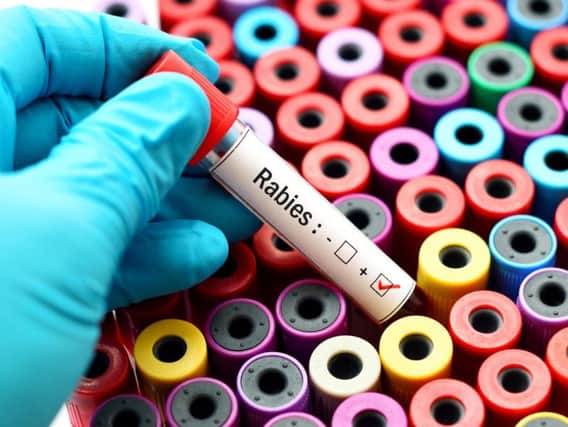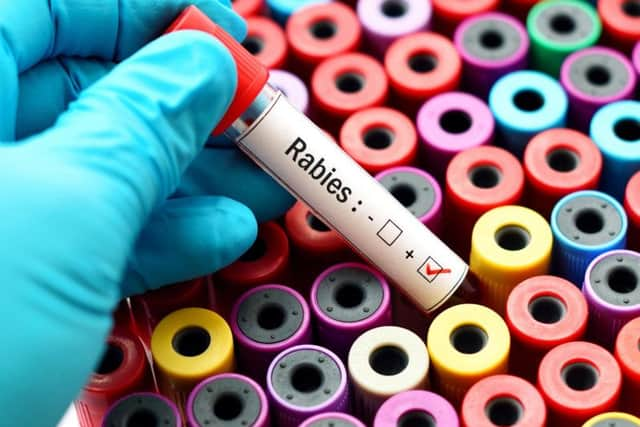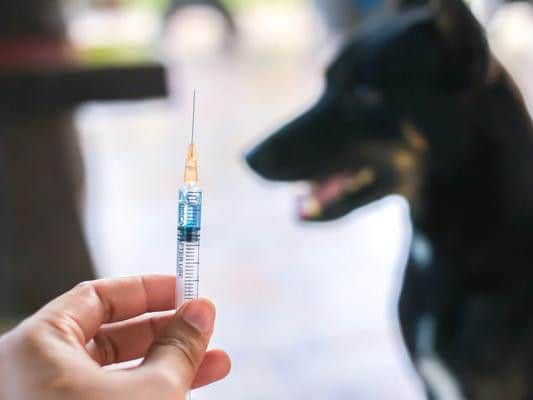Rabies symptoms: vaccinations, common signs, and what to do if you've been bitten or scratched


Rabies is found throughout the world, particularly in Asia, Africa, and Central and South America.
If you have been bitten or scratched by an animal in an area with a risk of rabies there are certain steps you should take to help prevent becoming infected, as it can be fatal when symptoms appear.
Advertisement
Hide AdAdvertisement
Hide AdHere are the common sign and symptoms of rabies and what to do if you’ve been bitten or scratched.


What to do if you've been bitten or scratched
The NHS explain that if you've been bitten or scratched by an animal in an area with a risk of rabies you should:
-immediately clean the wound with running water and soap for several minutes
-disinfect the wound with an alcohol- or iodine-based disinfectant and apply a simple dressing, if possible


Advertisement
Hide AdAdvertisement
Hide Ad-go to the nearest medical centre, hospital or GP surgery as soon as possible and explain that you've been bitten or scratched
“If this happens while you're abroad, get local medical help immediately. Do not wait until you've returned to the UK,” adds the NHS.
“If you've already returned to the UK without getting medical advice, it's still a good idea to get help – even if it's been several weeks since you were bitten or scratched.
“It's unlikely you've been infected, but it's best to be safe. Post-exposure treatment is nearly 100 per cent effective if it's started before any symptoms of rabies appear.”
Post-exposure treatment involves:
-cleaning and disinfecting the wound
Advertisement
Hide AdAdvertisement
Hide Ad-a course of the rabies vaccine – you'll need to have 4 doses over a month if you have not been vaccinated against rabies before, or 2 doses a few days apart if you have
-in some cases, a medicine called immunoglobulin is given into and around the wound – this provides immediate but short-term protection if there's a significant chance you've been infected
Treatment should be started promptly – ideally within a few hours of being bitten or scratched.
However, the NHS explain that “it's often safe to delay treatment until the next day if the vaccine or immunoglobulin need to be specially ordered in by your doctor.”
What are the symptoms of rabies?
Advertisement
Hide AdAdvertisement
Hide AdThe NHS notes that without treatment, the symptoms of rabies will usually develop after 3 to 12 weeks, although they can start sooner or much later than this.
The first symptoms can include:
-a high temperature (fever) of 38C or above
-a headache
-feeling anxious or generally unwell
-in some cases, discomfort at the site of the bite
Other symptoms appear a few days later, such as:
-confusion or aggressive behaviour
-seeing or hearing things (hallucinations)
-producing lots of saliva or frothing at the mouth
-muscle spasms
-difficulty swallowing and breathing
-inability to move (paralysis)
How to avoid being bitten or scratched
All mammals (including monkeys) can carry rabies, but it's most common in:
-dogs
-bats
-raccoons
-foxes
-jackals
-cats
-Mongooses
These animals can spread the infection if they bite or scratch you or, in rare cases, if they lick an open wound or if their saliva gets into your mouth or eyes.
Rabies is not spread through unbroken skin or between people.
While travelling in an area where rabies is a risk:
Advertisement
Hide AdAdvertisement
Hide Ad-avoid contact with animals – some infected animals may behave strangely, but sometimes there may be no obvious signs they're infected
-avoid touching any dead animals
Rabies vaccination
You should consider getting vaccinated against rabies if you're travelling to an area of the world where rabies is common and:
-you plan to stay for a month or more, or there's unlikely to be quick access to appropriate medical care
-you plan to do activities that could put you at increased risk of exposure to animals with rabies, such as running or cycling
Advertisement
Hide AdAdvertisement
Hide AdYou should visit your GP or a travel clinic if you think you may need the vaccine, but most people will have to pay for the rabies vaccine if it's needed for protection while travelling.
However, even if you've been vaccinated, you should still take precautions to avoid coming into contact with rabies if you're travelling in an area where rabies is found.
You should still get medical advice straight away if you've been bitten or scratched.